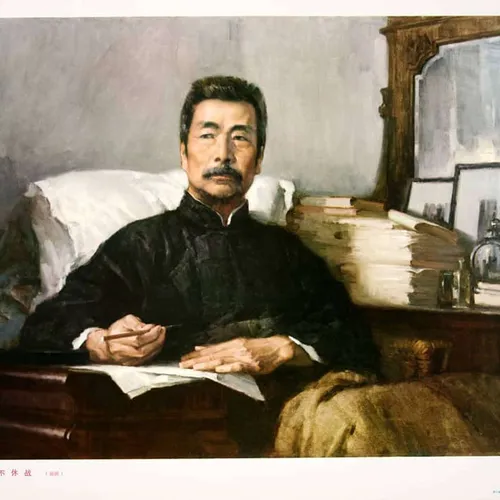
People's History of Ideas Podcast
In this podcast, Matthew Rothwell, author of Transpacific Revolutionaries: The Chinese Revolution in Latin America, explores the global history of ideas related to rebellion and revolution. The main focus of this podcast for the near future will be on the history of the Chinese Revolution, going all the way back to its roots in the initial Chinese reactions to British imperialism during the Opium War of 1839-1842, and then following the development of the revolution and many of the ideas that were products of the revolution through to their transnational diffusion in the late 20th century.
- Update frequency
- every 9 days
- Average duration
- 27 minutes
- Episodes
- 128
- Years Active
- 2019 - 2025

Running for Their Lives: The Retreat from the Jinggangshan (January to February 1929)
Mao and the Fourth Red Army break the encirclement of the Jinggangshan and retreat across southern Jiangxi with the Guomindang in hot pursuit.
Link to map of Jiangxi province: https://www.chinamaps.or…

Frameworks for Thinking about Tragic Historical Shortcomings of the Socialist Experience
Answering a listener question on the Great Leap Forward famine.
Further reading:
Mobo Gao, The Battle for China’s Past
United Nations, “Losing 25,000 to Hunger Every Day”
Minhaz Merchant, “Churchill’s Be…

The End of the Sixth Congress
We wrap up our discussion of the Sixth Congress with a discussion of the political line coming out of the congress, and some related issues.
Further reading:
Tony Saich, The Rise to Power of the Chines…

Clashing Communists and Comintern Guidance: The 6th Congress Gets off to a Rocky Start
Qu Qiubai’s report and proposal are disputed, and the Comintern intervenes to restore order.
Further reading:
Tony Saich, The Rise to Power of the Chinese Communist Party
Chang Kuo-t’ao [Zhang Guotao], …

Bukharin on the Nature of the Chinese Revolution in 1928
Our third (and last) close look at Bukharin’s speech at the 6th Congress of the Chinese Communist Party, held in Moscow in the summer of 1928.
Further reading:
Nikolai Bukharin, “On the International S…

Bukharin on the Theory of the Productive Forces (and Mao’s counterpoint on New Democratic Revolution)
Bukharin articulates a vision of the Chinese Revolution at the 6th Party Congress which is highly colored by the non-revolutionary Marxism of the 2nd International.
Further reading:
Nikolai Bukharin, “…

The ‘Third Period’ of the World Revolution: Bukharin’s Speech at the Sixth Congress of the Chinese Communist Party (June 1928)
Nikolai Bukharin kicks off the party congress with a very long speech.
Further reading:
Tony Saich, The Rise to Power of the Chinese Communist Party
Chang Kuo-t’ao [Zhang Guotao], The Rise of the Chines…

Preparations for the Sixth Party Congress (April to May 1928)
The decision to hold the Sixth Party Congress in Moscow, and some of the political debate inside the Communist Party of China leading up to that Congress.
Further reading:
Stuart Schram, ed., Mao’s Roa…

The Bailu Conference: Suppressing Orders from the Party Congress and Preparing to Leave the Jinggangshan (January 1929)
Potentially explosive guidance arrives in the Jinggangshan from the 6th Party Congress of the Communist Party, and plans are laid to break out of the enemy encirclement.
Further reading:
Stephen Averil…

The Base Area under Economic Blockade and Unification with the Fifth Red Army (End of 1928)
The national Guomindang center takes note of the Communists’ resilience, and takes charge of organizing a new suppression campaign, which is preceded by a tight economic blockade. Peng Dehuai makes h…

Vagrants, Mercenaries, and Rich Peasants (November 1928)
A close reading of a couple portions of Mao’s November 25, 1928 report to the Central Committee.
Further reading:
Stephen Averill, Revolution in the Highlands: China’s Jinggangshan Base Area
Stuart Schr…

Transforming, Building, and Purging the Party (September to November 1928)
Finishing our close reading of the resolution of the Border Area Party Congress of October 4 to 6, 1928. Also, the reorganization and purge of the party following the Communist recovery of the Jingga…

Opportunism and Self-Criticism: The Jinggangshan Party Congress Resolution of October 1928
A discussion of the concept of opportunism as it developed in the international communist movement, and a close reading of the self-critical portion of the resolution of the Border Area Party Congres…

“Why Is It that Red Political Power Can Exist in China?” (October 1928)
A close reading of the portion of the resolution of the Border Area Party Congress of October 4 to 6, 1928, which later became a key early text in the Maoist canon.
Further reading:
Stephen Averill, Re…

The August Defeat (Part 2): The Communists Strike Back (August to November 1928)
The Communists fight to regain lost territory, and ethnic tensions explode among the peasants in the base area.
Further reading:
Stephen Averill, Revolution in the Highlands: China’s Jinggangshan Base …

The August Defeat (Part 1)
The 29th Regiment goes against Mao’s orders and decides to stay in Hunan, with disastrous results for the Communists.
Further reading:
Stephen Averill, Revolution in the Highlands: China’s Jinggangshan…

The Yongxin Joint Conference and Mao’s July 4, 1928 Report to the Hunan Provincial Committee
Mao explains his refusal to comply with orders from the Hunan Provincial Committee.
Further reading:
Stephen Averill, Revolution in the Highlands: China’s Jinggangshan Base Area
Stuart Schram, ed., Mao’…

Clandestine Transcripts of Revolutionary Globalization: The Shining Paths of Late Cultural Revolution Maoism
A talk that I recently delivered at the University of Hamburg, focused on the development of a new socialist political economy late in the Cultural Revolution and how this influenced the Communist Pa…

Nuclear War and Communist Revolution
In light of the Ukraine crisis, a historical look at communist thinking on the connection between a third world war and revolution.
Further reading:
Sergei N. Goncharov, John W. Lewis, and Xue Litai, U…

The Beginning of the Midyear Crisis (June 1928)
The Hunan Provincial Committee decides that Mao must obey its authority.
Further reading:
Stephen Averill, Revolution in the Highlands: China’s Jinggangshan Base Area
Elizabeth Perry, Anyuan: Mining Chi…